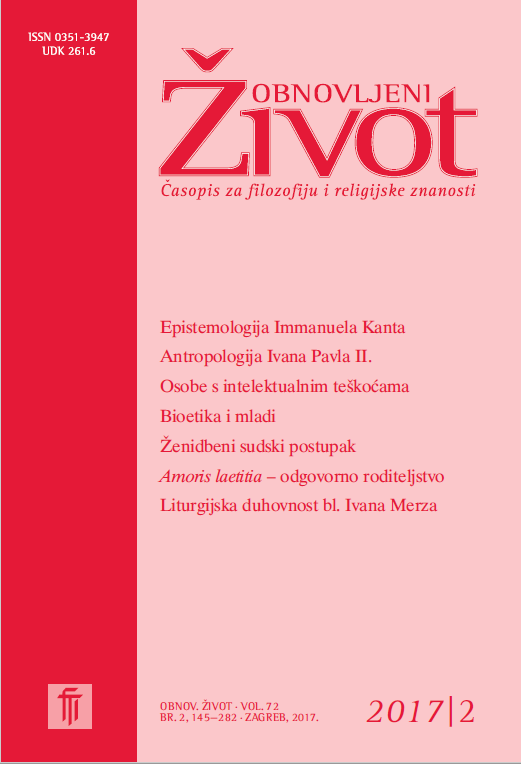The Liturgical Spirituality of Bl. Ivan Merz
Keywords:
liturgical spirituality, extra–liturgical devotions, Catholic Action, primacy of contemplation, liturgical movement, unity of lifeAbstract
Today, experience is again valued in theology. In this respect, the need is stressed for truths and values, aside from abstract notions involving man’s rational dimension, to be transmitted by way of a „model“ which includes also the experiential–emotional dimension. Through the „model“ method a particular truth and value is presented in the manner in which it is embodied and lived by a specific person, thus gaining in appeal. In this article, Ivan Merz is depicted as the model which existentially brought to pass the sustainable idea of a liturgical movement, of which he was an adherent, and also of a conciliar liturgical reform: to reestablish the liturgy as the source of spiritual life. In doing so, he skillfully avoids any one–sidedness and exclusivity. He stresses, and rightly so, the primacy of the liturgy, but without entering into a kind of „panliturgism“. Furthermore, he values extra–liturgical devotions, as well as individual prayer, but does not detach them from the liturgical context. Finally, he is aware that the liturgy must shape our mentality and activites in our daily lives and in society, however, by giving primacy to the contemplative dimension, he avoids allowing Christian involvement to be transformed into just another type of social program. Therefore, Merz is an example to us of an integral approach in which all three dimensions are intertwined, this not always being the case in ecclesial practice. The paper uses the analytical method to examine Merz’s works, his experience and numerous testimonies about him. Some controversies over the liturgical spirituality of his time are presented through the historical–descriptive method.
Downloads
Published
Issue
Section
License
Jednom prihvaćeni članak obvezuje autora da ga ne smije objaviti drugdje bez dozvole uredništva, a i tada samo uz bilješku da je objavljen prvi put u Obnovljenom životu. Uredništvo će obavijestiti autora o prihvaćanju ili neprihvaćanju članka za objavljivanje.
Članci objavljeni u časopisu se, uz prikladno navođenje izvora, smiju besplatno koristiti u obrazovne i druge nekomercijalne svrhe.


